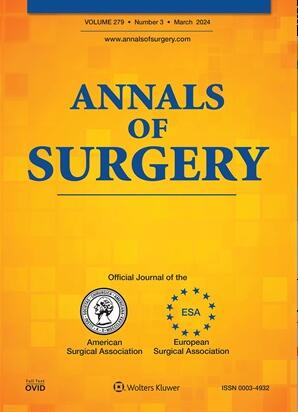The Time Has Come: The Case for Initiating Pilot Clinical Trials of Pig Kidney Xenotransplantation.
IF 7.5
1区 医学
Q1 SURGERY
引用次数: 0
Abstract
In vitro studies indicate that kidney transplantation from gene-edited pigs in which expression of all three of the known glycan xenoantigens has been deleted may be more challenging in nonhuman primates (NHPs) than it will be in human recipients. Furthermore, pig-to-human xenotransplantation offers several other advantages - (i) the patient can communicate with the surgical team; (ii) recipient microbiological monitoring and environment will be clinical-grade; and (iii) sophisticated graft monitoring and imaging techniques, (v) therapeutic interventions, e.g., dialysis, plasmapheresis, and (v) intensive care can be deployed that are not easily available in NHP laboratory models. We suggest, therefore, that progress to develop safe, informative human clinical trials will be accelerated if pilot clinical cases are initiated. The selection of patients for kidney xenotransplantation can include those who are at high risk of dying imminently, e.g., those experiencing increasing vascular access challenges with no realistic alternative therapy available, and those who have been accepted onto the waitlist for an allograft, but who are unlikely ever to receive one. Patients with an increased risk of dying include those with (i) age >60 years, (ii) blood groups O or B, and (iii) diabetic nephropathy. UNOS data indicate that an average of 25 patients on the kidney waitlist in the USA die or are removed from the list every day (i.e., >9,000 each year). Given the improved xenograft survival observed in preclinical studies, we suggest that it is time to plan a small pilot clinical trial for healthy dialysis patients who understand the risks and potential benefits of kidney xenotransplantation.时机已到:启动猪肾异种移植试点临床试验的理由。
体外研究表明,在非人灵长类动物(NHPs)中进行基因编辑猪肾移植(其中已删除所有三种已知糖类异抗原的表达)可能比在人类受体中进行肾移植更具挑战性。此外,猪对人异种移植还具有其他一些优势--(i) 患者可以与手术团队交流;(ii) 受体微生物监测和环境将达到临床水平;(iii) 可以使用复杂的移植物监测和成像技术;(v) 可以使用透析、血浆置换等治疗干预措施;(v) 可以使用 NHP 实验室模型不易使用的重症监护。因此,我们建议,如果启动试验性临床病例,将加快开发安全、信息丰富的人体临床试验的进度。肾脏异种移植患者的选择可包括那些面临即将死亡的高风险患者,例如,那些血管通路面临越来越大的挑战,却没有现实的替代疗法的患者,以及那些已被列入异体移植等待名单,但不太可能接受异体移植的患者。死亡风险增加的患者包括:(i) 年龄大于 60 岁;(ii) 血型为 O 型或 B 型;(iii) 糖尿病肾病。UNOS 的数据显示,在美国,平均每天有 25 名肾脏等待移植名单上的病人死亡或被除名(即每年超过 9,000 人)。鉴于临床前研究中观察到的异种移植存活率的提高,我们建议现在是时候为了解肾脏异种移植的风险和潜在益处的健康透析患者计划一项小型试点临床试验了。
本文章由计算机程序翻译,如有差异,请以英文原文为准。
求助全文
约1分钟内获得全文
求助全文
来源期刊

Annals of surgery
医学-外科
CiteScore
14.40
自引率
4.40%
发文量
687
审稿时长
4 months
期刊介绍:
The Annals of Surgery is a renowned surgery journal, recognized globally for its extensive scholarly references. It serves as a valuable resource for the international medical community by disseminating knowledge regarding important developments in surgical science and practice. Surgeons regularly turn to the Annals of Surgery to stay updated on innovative practices and techniques. The journal also offers special editorial features such as "Advances in Surgical Technique," offering timely coverage of ongoing clinical issues. Additionally, the journal publishes monthly review articles that address the latest concerns in surgical practice.
 求助内容:
求助内容: 应助结果提醒方式:
应助结果提醒方式:


